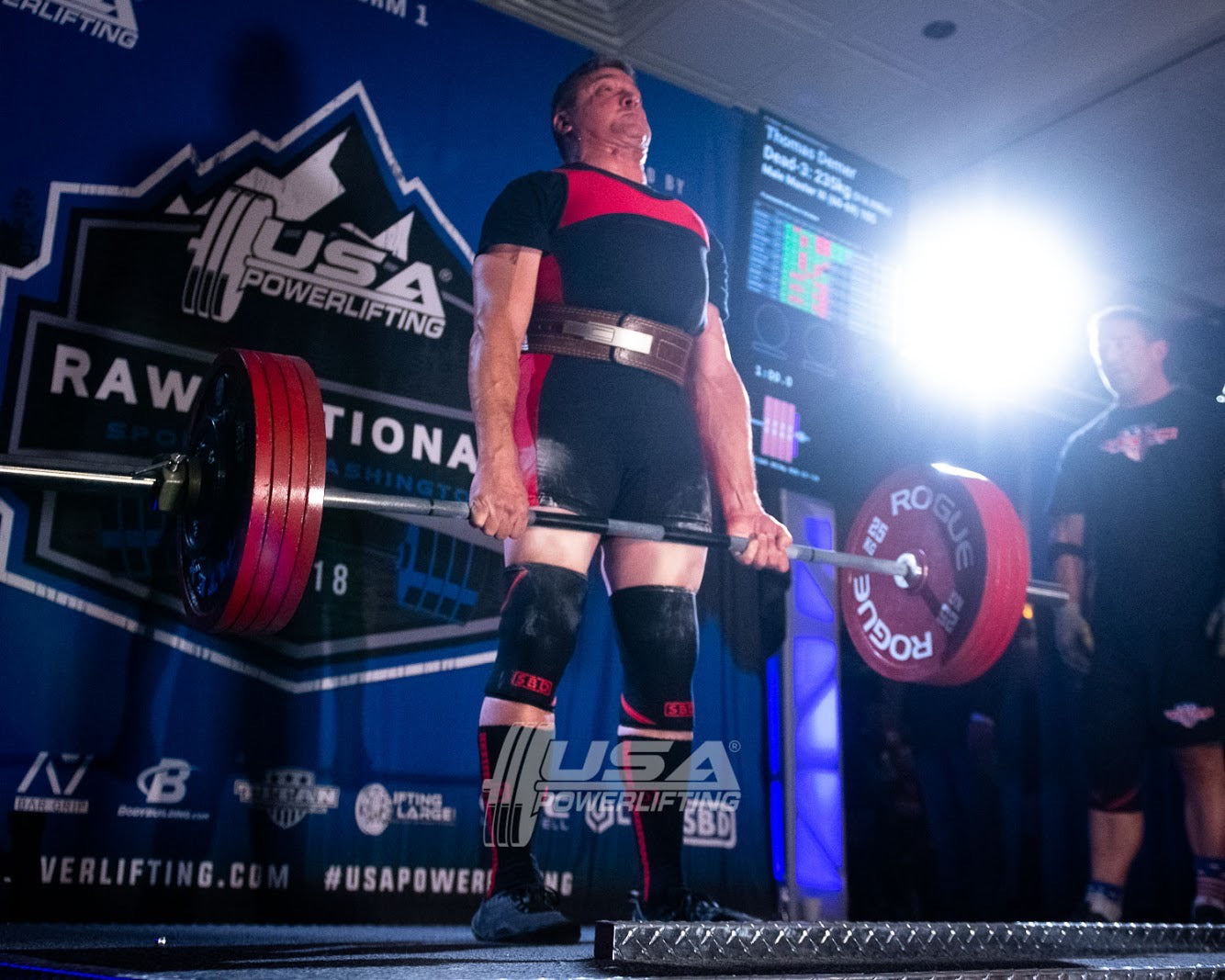For Tom Demer, music has truly been a lifelong pursuit. He’s in his 37th consecutive season performing with the Dallas Symphony, after first joining the outfit in 1985, and he’s been playing the viola for half a century. But everything else about the 64-year-old Demer is utterly at odds with the stereotypical image of a classical musician.
Demer is no will-o-the-wisp, slight of frame and fine of finger. The sexagenarian is an impressive powerlifter, with lifting maxes of a 295-pound bench press, 425-pound squat, and 530-pound deadlift.
The wildest thing, however, is that Demer wasn’t putting up these numbers in his 20s or 30s.
He set these weightlifting personal bests just a couple of years ago, in his early 60s.

Powerlifting and classical music don’t exactly go hand in hand, but Demer isn’t just a lifter, either. He’s an all-around athlete. He’s an avid cyclist and an in-line skater, among other endeavors. And for Demer, these athletic pursuits are an equally important part of his life.
In fact, he believes the practices of music and athletics share more in common than one might think.
A Life of Music
Born in Tucson, Arizona to a family of eight children, Demer began playing the violin at the age of six, and was also given piano and vocal lessons as a kid. “My parent’s really valued musical instruction for all of us kids,” said Demer, “but I was the only one that kept it up.”
He switched to playing the viola in the 9th grade, however. “I guess I was getting big, the teacher thought I was getting a bit too heavy-handed on the violin,” Demer noted, chuckling. “So the bigger instrument [viola] suited me. That was a good move for my career, because there was far less competition on the viola, at least at that time.”
After graduating high school spent a year in engineering school at the University of Arizona, but missed having time to practice and play the viola, so switched to music school, earning a performance major in 1980. Soon after that, Demer continued down the musical path by marrying a violinist. “The two of us immediately won auditions in Omaha, Nebraska after college.” Demer and his wife played a single season with the Omaha Symphony, before winning auditions in Fort Worth in 1982. That brought the couple to Texas, where they’ve stayed for the 40 some odd years since then. It took Demer two tries to get into the Dallas Symphony, which he entered in 1985. He still plays the viola there today.

“As a job, it’s at the top level in the United States for an employer,” said Demer. “Their budget is big enough to compare to any of the top symphonies in the country, so it’s a destination job. If you can get it, and keep it, most people stay there.” Luckily, keeping your job isn’t that hard, if you can get past the first few years. “Once a musician is given their third annual contract at the Dallas Symphony, they have tenure,” said Demer. “The first two years are probationary. After you have tenure, you can still be let go for lack of performance or for a clear cause, but in general, it’s more difficult to lose your job.”
Today the couple have a son, Paul Demer, who turns 30 this year and lives in Dallas. Like his father and mother, Paul is also a musician and has released several albums of folk music, most recently On the Way Back Down (2021).
But despite the rich connection with music that runs throughout his life (and that of his family), for Tom Demer, it’s clear that athletics is almost equally important.
From One Sport to the Next
Growing up in Tucson, Demer and a group of high school buddies regularly raced road bikes around town, and in the mountains outside of town. “Bike racing was really unpopular in the United States back in the 70s, but we were into it,” Demer said. “We just didn’t like football, traditional sports, I guess.”
He’s ridden, both competitively and casually, off-and-on for the rest of his life. “In 2003, I noticed a peloton of speed skaters on in-line skates come by my house. Six months later, Demer had bought his own pair of skates and was training with that very same group of skaters he’d seen riding by his house. He eventually had his own custom carbon-fiber skate boots made, and became an avid speed skater. Unfortunately, a crash in 2008 resulted in a broken hip, and he found it difficult to get back into high-level skating following the accident.
“My knees by then were so osteoarthritic I couldn’t skate five miles anymore. I was off skates for six years, and during those six years, I started doing CrossFit. Eventually that was too much running and jumping for my knees.” So he began to focus on powerlifting. “It turned out I was pretty talented,” he said, “so I started competing.”
In 2016, Demer attended the IPL World Championships of Powerlifting in Las Vegas, Nevada, in the Masters category (55 to 65 years old). Through a stroke of luck, there was no competition in that weight class and age group, and he managed to finish the meet with a score, so technically he was a Powerlifting World Champion that year.
However, to hear Demer tell it, that lack of competitors wasn’t so much luck, as a simple fact of the sport. “By that age, most powerlifters are either retired or injured, so luckily there isn’t a lot of competition,” Demer said, laughing.
Shortly after that, his right knee was replaced, and he tried to work back into competitive form, but his kneecap split in half during a training squat only two weeks before Nationals, in 2018. Somehow he simply kept on going.

“Just about everyone else with a broken kneecap is put into a wheelchair, but I didn’t know what was wrong,” he said. “I knew it hurt, but I could still extend my leg.” So Demer went to Nationals anyway, scoring a third-place finish and setting a personal deadlift record (530 pounds), all with a kneecap that was split completely into two parts. Six weeks later, he learned that the kneecap was broken on an x-ray. “And that was the end of my competitive powerlifting.”
He’s had several surgeries in the last few years, but in the interim, he’s begun skating again. “I’m not fast on skates anymore, but I can skate whenever I want. Cycling, too.”
Always in Sync
Demer sees a lot of parallels in powerlifting, skating, and classical music, both when it comes to training and performing. “The disciplined, methodical training is a lot like practicing for a musical performance,” he said. “I’ve often thought that skating in sync, with your strides synchronized, feels amazingly like chamber music,” he added. “You’re completely in tune with other humans performing the same activity with the same goal in mind.”
Even when performing, Demer keeps a bit of his skating side with him. His cufflinks on his Coregami dress shirt are skate bearings!

Demer’s twin passions for athletics and music almost perfectly matches Coregami apparel’s marriage between athletic wear and formal wear. So it’s no surprise he enjoys Coregami apparel. But perhaps above all else, he joked that he appreciates our apparel because he “sweats more than anyone else on the planet!”
“Coregami apparel feels like a cycling jersey or a skating outfit,” he added, “even though it looks like full-dress concert wear. You don’t have to wear an undershirt, since these shirts don’t show your skin through the front, and the shirts are really stretchy, so you forget you’re wearing them. They also never pull like a cotton shirt does, and don’t need ironing,” he added.
Don’t Fall
Despite the numerous athletic endeavors he’s involved in, Demer doesn’t hesitate to say that music is what really gets him up out of bed in the morning. “Music is my passion,” he said. “In my spare time, what I like to do most is make music. Not in the orchestra necessarily… There’s a lot of music outside of playing in the orchestra.” (Demer added that, in addition to classical music, he’s maintained a lifelong parallel career as a country and rock fiddler, in addition to doubling on mandolin and tenor banjo.)
While many folks who are active earlier in life slowly start to decrease their fitness goals and regimens as they become older, Demer seems to be more and more drawn to physical fitness the older he becomes, for precisely the reason that many people fall off the wagon.

“I always want to stay physically active,” he said. “I don’t want to be in that group that loses a percentage of muscle mass every year as they age. I want to do the best I can to fight that.” But it’s a pleasure thing, too. “I’m just really happy outside on skates, with the wind in my face,” he said. “The technique of skating is just as involved as the technique of playing the viola. It takes daily, proactive, constant thought. I can’t listen to music while I skate, I have to concentrate on technique and my surroundings.”
Unlike when playing the viola, however, constant concentration while skating isn’t just necessary to maximize his performance. It’s necessary to avoid an injury (which, in his mid-60s, would likely be grievous).
“The mantra when I skate is: Don’t Fall. Don’t Fall. Don’t Fall,” Demer said, chuckling.
“I can’t afford to break any more bones!"





